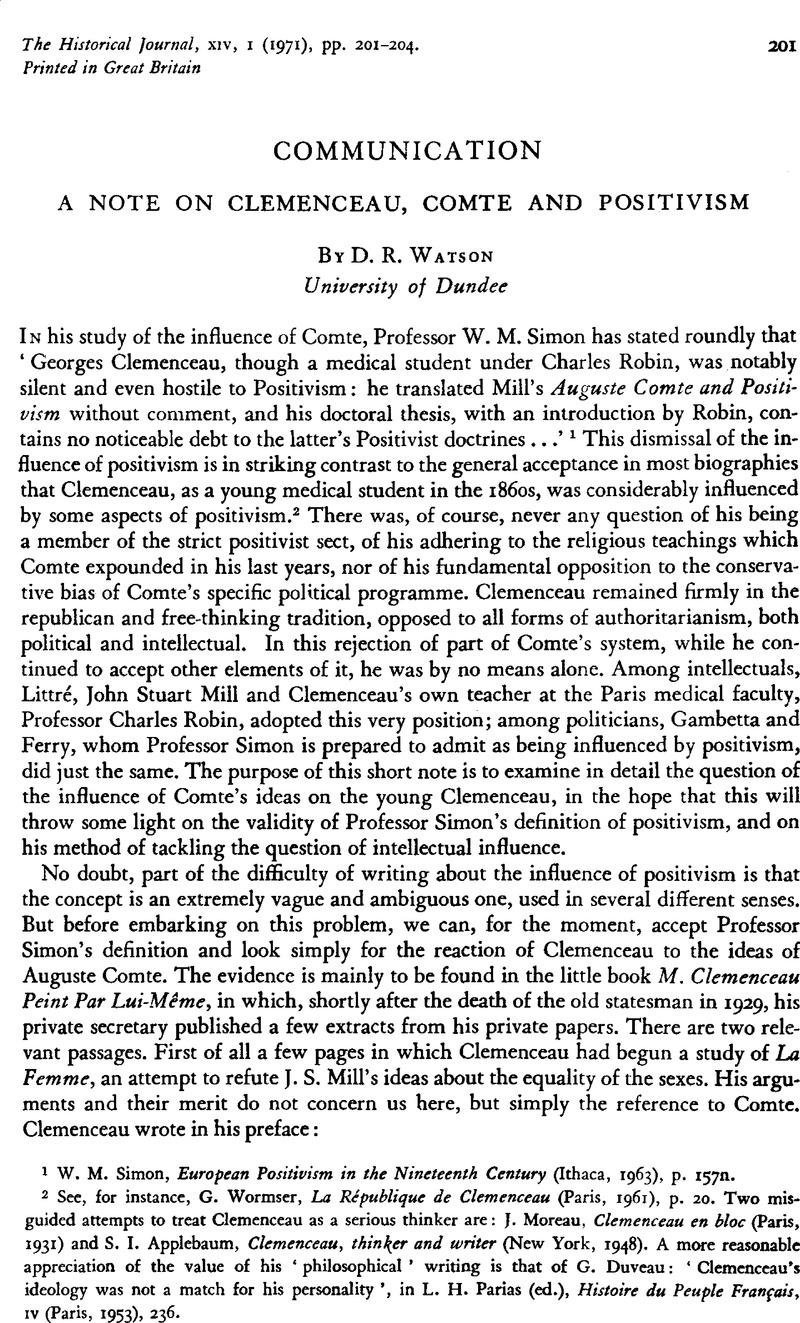No CrossRef data available.
Published online by Cambridge University Press: 11 February 2009

1 Simon, W.M., European Positivism in the Nineteenth Century (Ithaca, 1963), p. 157n.Google Scholar
2 See, for instance, Wormser, G., La République de Clemenceau (Paris, 1961), p. 20Google Scholar. Two misguided attempts to treat Clemenceau as a serious thinker are: Moreau, J., Clemenceau en bloc (Paris, 1931)Google Scholar and Applebaum, S.I., Clemenceau, thinker and writer (New York, 1948)Google Scholar. A more reasonable appreciation of the value of his ‘ philosophical ’ writing is that of Duveau, G.: ‘ Clemenceau's ideology was not a match for his personality’, in Parias, L.H. (ed.), Histoire du Peuple Francois, iv (Paris, 1953), 236.Google Scholar
3 Martet, J., M. Clemenceau feint far Lui-Même (Paris, 1929), p. 261.Google Scholar There is a puzzle here in that Comte's hierarchy of the sciences descended from biology to sociology, and not the other way; in the rest of the extract Clemenceau in fact argues from the biological to the sociological level, and it seems that this is simply a mistake, either a slip of Clemenceau's pen, or a mistake in transcription on the part of Martet. It would be interesting to check from the original document, but I have been refused permission to consult it.
4 Martet, J., op. cit. p. 231.Google Scholar
5 Clemenceau, G., La M'ee Sociale (Paris, 1895), p. 145Google Scholar, and Le Grand Pan (Paris, 1896), p. 3.Google Scholar
6 G. Clemenceau to A. Scheurer-Kestner, unpublished letter of 2 Feb. 1863 in the Bibliothèque Nationale, Nouvelles Acquisitions Francaises, 24409, fo. 38.
7 Clemenceau to Scheurer-Kestner, unpublished letter of 10 Feb. 1865 (N.A.F. 24409, fo. 98): ‘ I submit my thesis next month. I have not yet really started it. I have not even decided on a subject, but it will only take me a fortnight.’ He took his oral examinations on 13 May 1865. This time scale throws an amusing light on attempts to treat this thesis as an important and original piece of writing.
8 Clemenceau, G., De la Génération des Eléments Anatomiques (2nd ed., Paris, 1867), p. 183 and p. 279.Google Scholar
9 G. Clemenceau to A. Scheurer-Kestner, unpublished letter of 31 Oct. 1867, N.A.F. 12704, fo. 442.
10 Simon, W.M., op. cit. p. 156.Google Scholar
11 G. Clemenceau to A. Scheurer-Kestner, unpublished letter of 2 Feb. 1863, N.A.F. 24409, fo. 38.
12 G. Clemenceau to A. Scheurer-Kestner, unpublished letter of 16 Sept. 1863, N.A.F. 24409, fo. 46.
13 Renan, E., Souvenirs d'Enfance et de Jeunesse, p. 219Google Scholar, quoted by Charlton, D.G., Positivist Thought in France (Oxford, 1959), p. 21.Google Scholar
14 On Blanqui's materialist philosophy, see Spitzer, A.B., The Revolutionary Theories of Louis Auguste Blanqui (New York, 1957), pp. 31–33Google Scholar. and Dommanget, M., Les Idfes Politiques et Sociales d'Auguste Blanqui (Paris, 1957), pp. 221'95.Google Scholar
15 Clemenceau, G., Au Soir de la Pensée (Paris, 1927).Google Scholar The one novel that he wrote, Les Plus Forts (Paris, 1898)Google Scholar is also full of sociological ideas derived, at least in part, from Comte. Another example of his use of Comte is the remark made in his defence of his diplomacy in 1919: ‘Chacun de nous vit dans le cadre de son histoire. Auguste Comte a dit que nous vivons des morts: c'est vrai.’ Tardieu, A., La Paix (Paris, 1921), p. 105.Google Scholar